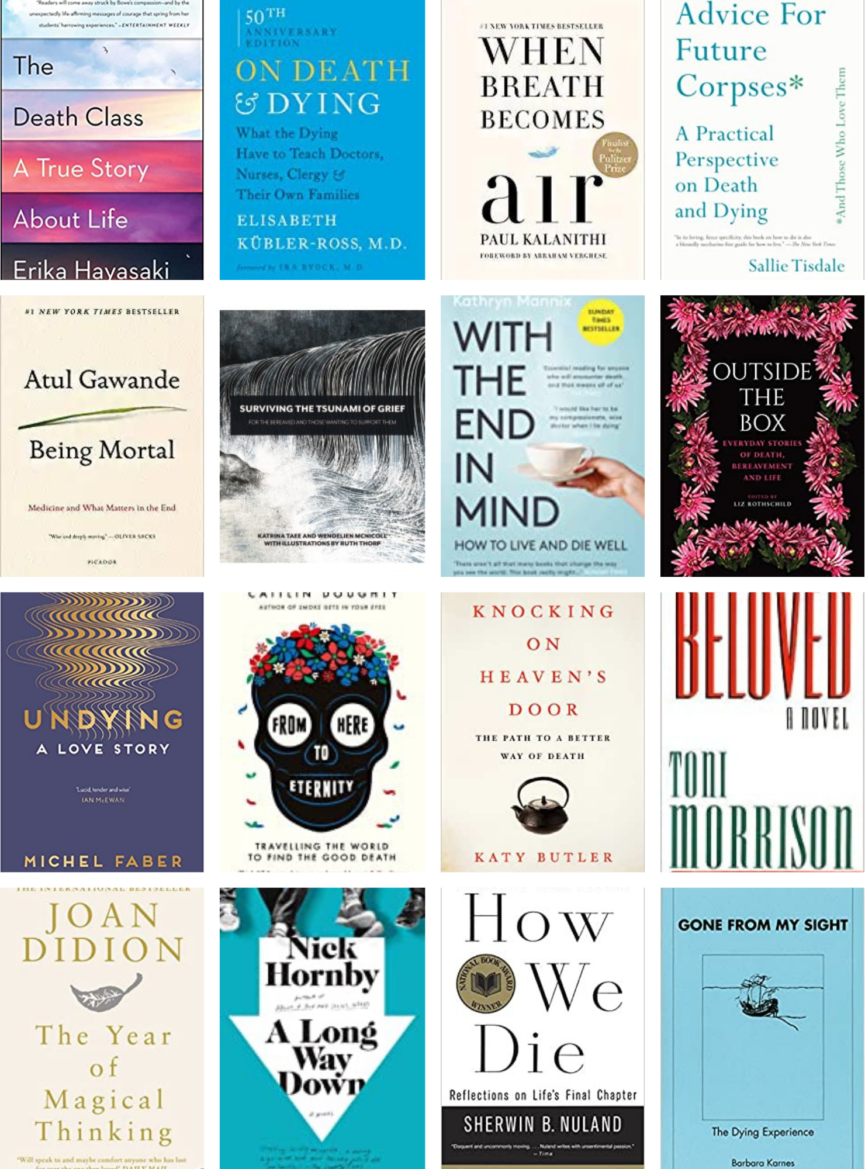It might sound morbid to actively seek out information on death and dying, but as humans whether we want to or not, we do dwell on death. Believe it or not, reading about dying can actually be a very helpful and practical activity that serves a range of purposes. Reading about death can help us through different stages of the grieving process, can help us face our fears about dying and can also be useful when you or a loved one have been diagnosed with a terminal illness. It’s easy to sweep the topic of death under the carpet until you lose someone you love or you are faced with a terminal diagnosis yourself, but we encourage you to read your way around your questions and fears. There are literally thousands of books out there on the topic of death and dying, but here we’ve put together a small reading list (in no particular order) of some of what is available out there for you. Ultimately, you have to do what works for you, but we hope that this article provides some guidance in a useful direction. We’ve also included some books to help children understand death at the end of this article. Surviving the Tsunami of Grief – Katrina Taee and Wendelien McNicoll “An illustrated and oral guide to grief, for those who are grieving and their families and friends who are supporting them. It offers guidance, wisdom and hope for the longer bereavement journey. The last three chapters suggest ways people can help those who grieve and offers practical and useful suggestions to support them.” With the end in Mind – Dr Kathryn Mannix “How should we think of death and how can we prepare for it? With the End in Mind is a book for us all: the grieving and bereaved, the ill and the healthy. By turns touching and tragic, funny and wise, it tells powerful human stories of life and death… A powerful and emotional book based on a lifetime’s clinical experience, With the End in Mind offers calm, wise advice on how to face death, live fully and find a model for hope in dark times.” Outside the Box – Liz Rothschild “We live in a society where people struggle to look death in the eye. Death has become the territory of professionals and we rarely see a dead body, unless it is someone very close to us. Death has become hidden, and so more traumatic. This book shows that, if we start talking openly about death, it can change the way we live. In it, people from all walks of life share their experiences and what they have learned from accompanying others. Heartbreaking, angry, questioning and contradictory – even laugh-aloud funny – the stories illuminate, inspire, reassure and inform. They are accompanied by advice and comment from professionals working in end-of-life planning, health, bereavement and funeral care.” Undying – Michael Faber “In Undying Michel Faber honours the memory of his wife, who died after a … Read More
Dealing with anticipatory grief
What is anticipatory grief? We all dread getting the heartbreaking news that someone we love is terminally ill. Did you know that grief over the loss of the person with the terminal diagnosis often starts as soon as we get the bad news? Most people are familiar with the term grief and what it means, but many of us have never heard of anticipatory grief. Anticipatory grief is mourning a loss of something before it is gone. Chances are, even if you’ve never heard of anticipatory grief that you’ve experienced yourself if you’ve known the loss of someone you love was imminent. Anticipatory grief doesn’t just apply to situations involving a terminal illness such as cancer. You can also experience anticipatory grief when a loved one has an illness that changes their personality, such as Dementia. Not everyone experiences anticipatory grief, but if you do it’s important that you talk to someone to help you deal with it. What causes anticipatory grief? Anticipatory grief can come about for several reasons, and it may not always be the loss of your loved one’s life that you are mourning, at least in the beginning. When someone you love experiences a life changing or terminal illness, life changes for everyone around them. It may be that you are mourning for the life you had “before”, especially if you have become that person’s carer. It is natural to miss what was and for wish to things to go back to how they were if life has changed dramatically. You may feel that you have lost your sense of freedom and that you are burdened with the extra responsibility of caring for your ill loved one, and this in turn may bring feelings of guilt. However, feeling like this is a very normal response to such a big change to your life. Healthdirect.gov.au also states that you might grieve for the memories you share with your loved one, particularly as they lose their independence, their memory, and their ability to recognise you. You may grieve for future plans that will never happen and experience intense and conflicting emotions. Symptoms of anticipatory grief If you are dealing with anticipatory grief, it is likely that you are experiencing a wide range of emotions about the impending loss of the person you love, or, in the case of a permanently personality changing illness, the loss of the person as you know them before they are truly gone. You may feel anger, fear, resentment, guilt, dread, powerlessness and anxiety even though the person is still alive. Writer Angie Drakulich shares her experience with anticipatory grief for her father in an article published on the website Psycom. She writes, “[These thoughts and memories] invade my mind as I try to fall asleep and they are the first images that appear when the alarm sounds. They cloud my vision as I drive from home, to work, to the grocery store, and they emerge through tears as I try to get away … Read More


